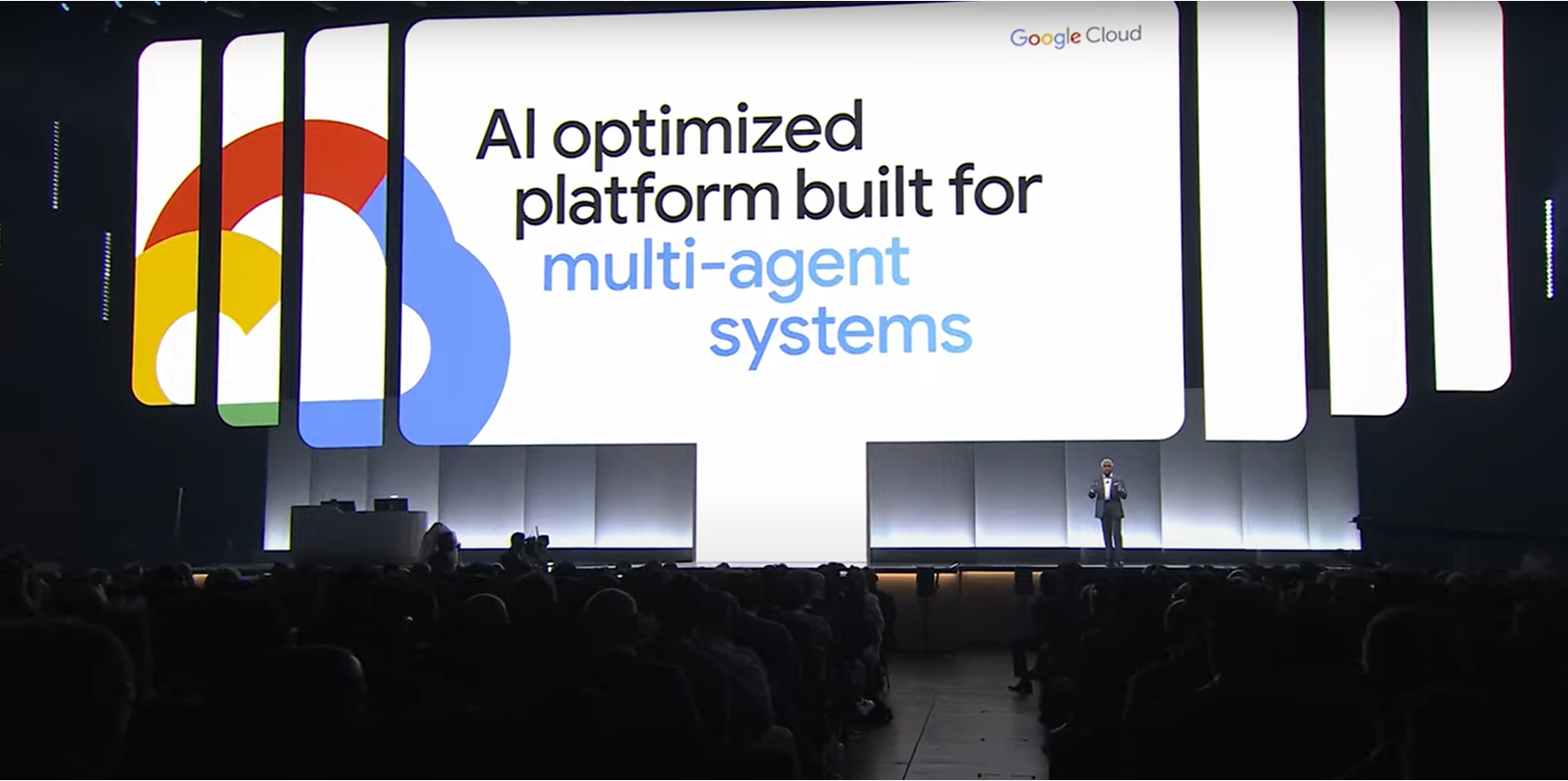With a wide range of announcements connected to AI development, infrastructure, connectivity, security, and platforms, this year’s Google Cloud Next in Las Vegas highlighted how enterprises are beginning to prioritize interoperability, openness, and end-to-end capabilities for their AI investments. It also signaled why selecting and working with AI partners that embrace these priorities is of paramount importance.
During the keynote for the annual event’s 30,000+ attendees, Google Cloud CEO Thomas Kurian and Google CEO Sundar Pichai unveiled a roster of new offerings that appealed to consumers, developers, and enterprises looking to leverage Google’s expanding AI platform and offerings, with a particular emphasis on providing cloud network, infrastructure, and scalability to power AI models.
Pichai announced the global availability of the hyperscaler’s Cloud Wide Area Network (Cloud WAN), a major expansion in its networking capabilities that builds upon Google’s Cross-Cloud Network platform for secure connectivity across hybrid and multicloud environments. Google acknowledged that the market’s race to capitalize on AI is causing stress and scalability issues on enterprise networks, especially for AI-based applications that rely on distributed cloud environments. Cloud WAN will provide enhanced security and connectivity between virtual private clouds, in addition to a Gemini Cloud Assist feature to optimize network operations.

The announcement of Cloud WAN was coupled with a raft of announcements in infrastructure, security, and AI platforms, including:
- The unveiling of Ironwood TPU, Google’s seventh-generation Tensor Processing Unit, and the Axion Processor, a new custom Arm-based CPU designed for data centers for optimal performance and energy efficiency.
- Enhanced Gemini 2.5 Pro and Flash models to process text, audio, video, code, and other content formats within a unified interface, as well Veo 2 and Imagen 3 for multimedia generation, including text-to-video capabilities and AI-powered image creation.
- Enhancements to Google’s flagship Vertex AI platform, such as the introduction of Vertex AI Agent Builder, facilitating the accelerated creation of customer and employee agents using either natural language or a code-first approach, whichever is preferred or required.
- Google Unified Security (GUS), an AI-powered cybersecurity platform with automated threat intelligence for enhanced security operations, as well as a new Gemini feature that can be integrated into security operations to provide conversational access for threat detection and response.
The opening keynote also featured video testimonials and case studies from a wide range of Google Cloud clients across industries, including McDonald’s, Walmart, Intuit, Uber, News Corp., and Vodafone. The testimonials not only demonstrated the ubiquitousness of Google Cloud’s AI platform and offerings in real-world enterprise operations and customer service, but they were also a clear reflection of the hyperscaler’s momentum within the cloud space in terms of attracting marquee clients and grabbing additional cloud market share.
With many announcements focused on enhancing the AI ecosystem and prioritizing enterprise flexibility, Google Cloud Next was an important barometer of the enterprise market’s evolving expectations for AI and AI platform providers. While many have clear preferences for cloud providers and AI platforms such as those offered by Google Cloud, many enterprises want to maintain their ability to make adaptations and choices to respond to business needs and industry demands — especially with the AI industry’s ongoing, lightning-fast evolution. In some cases, this requires migration of cloud and applications from an incumbent hyperscaler to Google Cloud or implementing tools and offerings that allow for seamless operations between multiple clouds and platforms.
Google Cloud relies on key partners to demonstrate that its offerings can provide the kind of scalability and choice that enterprises need to fully capitalize on AI trends without constraints that may impact business agility. At this year’s event, Persistent received the 2025 Google Cloud Infrastructure Modernization Partner of the Year Award for Asia Pacific. This recognition highlights Persistent’s achievements in helping enterprises seamlessly transition to Google Cloud, enabling cost optimization, scalability, and advanced AI-driven analytics for business growth. The award builds on last year’s announcement when Persistent entered into a Strategic Partnership Agreement with Google Cloud for expanded reach across the US, India, UK, and Australia, focused on driving joint go-to-market activities for enterprises globally.
Here’s how Persistent helps clients make the most of their AI and cloud investments:
- Managed cloud operations: Scaling AI workloads in the cloud would require access to high-performing resources that are also costly. Before they can see pay-offs from setting up an AI system powered by the cloud, enterprises need to adopt cloud best practices, identify the best-fit resources (underlying LLMs, data warehouses, AI engines), and manage them for optimal utilization. Persistent offers expertise and guidance in business-aligned AI systems that work to deliver the intended goals within enterprise budgets. We have helped clients manage AI workloads in the cloud by creating automation-led visibility with real-time application monitoring and observability.
- AI-first infrastructure: Since AI is all about the underlying cloud infrastructure, Persistent helps enterprises manage network and cloud environments with best-fit AI services that serve their business objectives. With highly differentiated AI technology stacks in the market, Persistent works with enterprise business leaders to craft an AI strategy that defines the right technology mix for a business use case. With one of the oldest data practices for a cloud transformation partner, Persistent helps enterprise clients set the stage with under-the-hood data pipelines, governance guardrails, and relentless automation.
- Secure by Design: As enterprises allow business users the autonomy to interact with AI applications, they need to ensure these interactions do not expose the organization to vulnerabilities or additional risks. It is important to govern AI applications and workloads with best practices, ensuring that AI applications are built securely by design, accounting for every known vulnerability, and that they are constantly scrubbed for any new gaps or incidents that could further deteriorate the risk profile. Persistent’s security solutions are custom-built for proactive security monitoring and threat detection, feeding into advanced security protocols such as zero trust and identity and access management.
As in past years, Google Cloud Next generates a high degree of welcomed enthusiasm and excitement for what’s achievable in building and optimizing AI-powered applications delivered on a highly scalable cloud infrastructure. This year’s event touched on virtually every part of the AI ecosystem, with offerings and ideas that appealed to a variety of diverse audiences. It also brought into sharp relief how enterprises continue to need strategic partners like Persistent to navigate an AI environment evolving at a breathtaking pace.
Talk to us about leveraging Google Cloud for your enterprise transformation.
Author’s Profile
John Madden
Global Thought Leadership Marketing Lead







